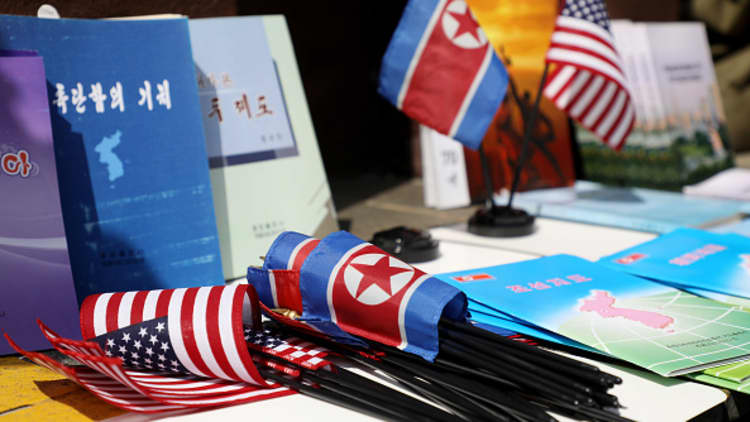
The events at the G-7 summit may have weakened President Donald Trump heading into the summit with North Korean leader Kim Jong Un, former diplomat Nick Burns told CNBC on Monday.
Trump and Kim are set to meet in Singapore on Tuesday morning, with the U.S. president fresh off the G-7 summit last weekend in Canada.
"That was a very distributing performance by the president," Burns said on "Closing Bell," referring to Trump's behavior at the meeting of the Group of Seven industrialized nations.
On Sunday, Trump refused to endorse a declaration calling for a reduction in tariffs and lashed out at U.S. allies for allegedly treating the United States unfairly.
"He increasingly is seen by other leaders around the world, our friends and allies as well as our opponents, as someone who's a little bit erratic and unstable and unpredictable and doesn't keep his word," said Burns, who served as U.S. ambassador to NATO and was the State Department's third-ranking official during George W. Bush's presidency. He also advised the administrations of George H.W. Bush and Bill Clinton.
He thinks leaders in both North Korea and China may be a bit more reluctant to sign up to a series of commitments with the U.S. given the "havoc" the president created at the G-7.
"You can bet the North Koreans are watching closely. It may make them back off. It may make the Chinese back off going down this road the way that the United States wants to do it on this nuclear issue," said Burns, also a CNBC contributor.
Fred Kempe, president and CEO of the Atlantic Council, thinks the Trump administration is hoping the pressure of sanctions, coupled with military threats, has changed Kim's calculations about his survivability.
He said that's what leaders in South Korea believe.
Kim's "got his nuclear weapons. He's got his ballistic missiles. But what he hasn't got is he hasn't got survivability of his regime. And he hasn't got economic growth of his country," Kempe told "Closing Bell."
"He can't get his country moving. He's running out of money," Kempe added.
Complete denuclearization
On Sunday, Trump claimed North Korea agreed to "denuclearization" ahead of the meeting. However, that's not the case.
North Korea said Friday it would suspend nuclear tests and intercontinental ballistic missile launches ahead of summits with the U.S. and South Korea. Kim also said a nuclear test site would be closed and "dismantled" now that the country has learned how to make nuclear weapons and mount warheads on ballistic rockets.
But the North has stopped short of saying it has any intention of abandoning its nuclear arsenal, with Kim making clear that nukes remain a "treasured sword."
Burns thinks Trump probably wouldn't be in Singapore unless some sort of joint statement with North Korea about denuclearization and dismantlement of weapons and facilities had already been worked out.
If something is accomplished in Singapore, it would be a start but there would still be a long way to go, he noted.
"It would be the first step of a thousand steps, or 10,000 steps that could take months or years," Burns said.
Bruce Heyman, former U.S. Ambassador to Canada, said what is needed is "complete denuclearization."
"To get there and to do that, we need to be able to make sure that it is verifiable and complete. And so that's a big task and I don't think we're going to know that in the next 24 hours," he told "Closing Bell."
"Even if we get a complete commitment, this country has been known to give commitments to Republican and Democratic presidents alike and have fallen back on that," he added.
— The Associated Press contributed to this report.


